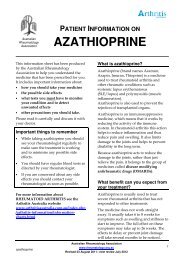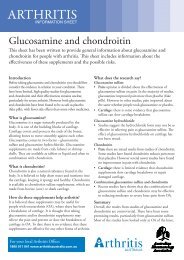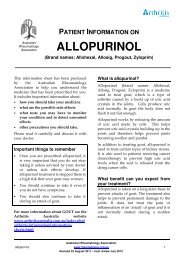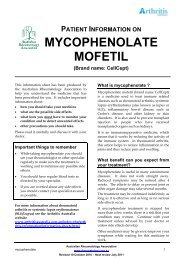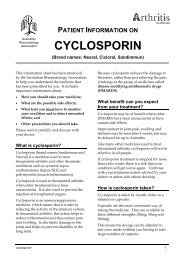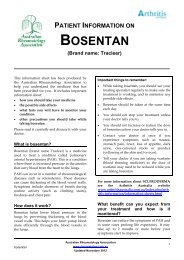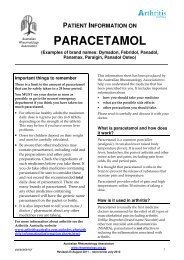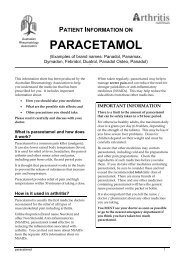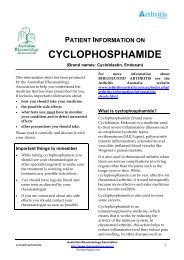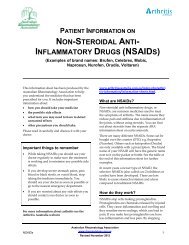patient information on gold - Australian Rheumatology Association
patient information on gold - Australian Rheumatology Association
patient information on gold - Australian Rheumatology Association
Create successful ePaper yourself
Turn your PDF publications into a flip-book with our unique Google optimized e-Paper software.
<strong>Australian</strong><br />
<strong>Rheumatology</strong><br />
Associati<strong>on</strong><br />
PATIENT INFORMATION ON<br />
GOLD<br />
What is Gold Therapy<br />
Gold medicines are used to treat rheumatoid<br />
arthritis. They may also be used<br />
occasi<strong>on</strong>ally to treat other diseases such as<br />
psoriatic arthritis.<br />
They are prepared from metallic <strong>gold</strong>. They<br />
have been used to treat rheumatoid arthritis<br />
for over 70 years. While <strong>gold</strong> can be very<br />
effective for some <str<strong>on</strong>g>patient</str<strong>on</strong>g>s, it is used<br />
infrequently today as more effective<br />
medicines have become available.<br />
It is not entirely clear how <strong>gold</strong> works but it<br />
is thought to have an effect <strong>on</strong> the activity of<br />
the immune system.<br />
In rheumatoid arthritis, this acti<strong>on</strong> helps to<br />
reduce inflammati<strong>on</strong> and thus reduce pain<br />
and swelling. It also limits damage to the<br />
joints and helps to prevent disability in the<br />
l<strong>on</strong>g term.<br />
Because Gold acts to reduce the damage to<br />
the joints, rather than just relieve the pain, it<br />
bel<strong>on</strong>gs to the group of medicines called<br />
disease modifying antirheumatic drugs<br />
(DMARDs).<br />
What benefit can you expect from<br />
your treatment<br />
Between 60% and 70% of people treated<br />
with <strong>gold</strong> resp<strong>on</strong>d well. Many improve<br />
quite dramatically and some may even go<br />
into remissi<strong>on</strong> where the arthritis virtually<br />
disappears.<br />
Gold treatment does not work straight<br />
away. Improvement in joint pain, swelling<br />
and stiffness is usually seen in 8 to 12 weeks.<br />
However it may take up to 6 m<strong>on</strong>ths in<br />
some people to show any benefits.<br />
Other medicines may be given to improve<br />
your symptoms while waiting for <strong>gold</strong><br />
treatment to work.<br />
If your arthritis is well c<strong>on</strong>trolled with <strong>gold</strong><br />
and there are no side effects, you can take<br />
the medicine indefinitely. It may be possible<br />
to reduce or even stop treatment, but <strong>on</strong>ly<br />
<strong>on</strong> your doctor’s advice.<br />
If <strong>gold</strong> treatment is stopped for more than a<br />
few weeks there is a risk that your c<strong>on</strong>diti<strong>on</strong><br />
will get worse again. C<strong>on</strong>tinue with your<br />
treatment unless advised by your doctor or<br />
unless side effects develop.<br />
How is <strong>gold</strong> given<br />
One form of <strong>gold</strong>, sodium aurothiomalate<br />
(brand name Myocrisin®) is a liquid, which<br />
is injected into a muscle. The other form,<br />
auranofin (brand name Ridaura®), is taken<br />
as tablets.<br />
Injectable <strong>gold</strong> is given into the large<br />
muscles such as the buttock or shoulder, not<br />
into the joints.<br />
The first dose is usually a very small "test"<br />
dose e.g. 10 mg to make sure that you are<br />
not sensitive to the medicine.<br />
Gold 1
The usual maintenance dose for adults is in<br />
the range of 25 to 50mg. This is given <strong>on</strong>ce a<br />
week for the first 4 to 6 m<strong>on</strong>ths. After that,<br />
if there is an improvement in your<br />
c<strong>on</strong>diti<strong>on</strong>, the frequency of injecti<strong>on</strong>s may be<br />
reduced to fortnightly or even m<strong>on</strong>thly<br />
intervals.<br />
It is generally not a problem if you miss a<br />
single dose of <strong>gold</strong>, for example if you are<br />
<strong>on</strong> holidays. A change in the schedule of<br />
dosage can be worked out beforehand.<br />
Gold tablets are less frequently used than<br />
injecti<strong>on</strong>s, as they seem to be less effective.<br />
They are taken daily at a dose of between<br />
<strong>on</strong>e and three of the 3 mg tablets.<br />
Gold may be used with other arthritis<br />
medicines including:<br />
• other DMARDs such as<br />
Methotrexate;<br />
• steroid medicines such as prednisol<strong>on</strong>e<br />
or cortis<strong>on</strong>e injecti<strong>on</strong>s into the joint;<br />
• anti-inflammatory medicines (NSAIDs)<br />
such as naproxen or ibuprofen; and/or<br />
• simple pain killers such as paracetamol.<br />
Are there any side effects<br />
Below are side effects that you might<br />
experience with your treatment. Tell your<br />
doctor if you experience any side effects.<br />
If you do experience side effects, a reducti<strong>on</strong><br />
in dose may minimise these so that you can<br />
c<strong>on</strong>tinue to take the medicine. Your doctor<br />
will advise <strong>on</strong> any dose changes that are<br />
necessary.<br />
Most comm<strong>on</strong> side effects:<br />
• The most comm<strong>on</strong> side effects include<br />
skin itchiness, a variety of skin rashes<br />
and increased sensitivity to the sun. It is<br />
a good idea to apply sunscreen and wear<br />
a hat when out in the sun.<br />
• Other side effects such as mouth ulcers,<br />
alterati<strong>on</strong>s in taste (metallic taste), hot<br />
flushes and diarrhoea can sometimes<br />
occur.<br />
• Immediately following an injecti<strong>on</strong> you<br />
may feel dizzy, flushed or weak. These<br />
feelings should go away if you lie down<br />
for a few minutes. If this persists you<br />
should c<strong>on</strong>tact your doctor.<br />
• Joint pain for <strong>on</strong>e or two days after the<br />
injecti<strong>on</strong> may also occur but should <strong>on</strong>ly<br />
happen with the first few injecti<strong>on</strong>s. If<br />
this persists you should c<strong>on</strong>tact your<br />
doctor.<br />
Less comm<strong>on</strong> or rare side effects:<br />
There are some rare but potentially serious<br />
side effects with <strong>gold</strong> treatment.<br />
• Blood cells: Gold may cause a drop in<br />
the numbers of white blood cells, which<br />
are needed to fight infecti<strong>on</strong>. It may also<br />
cause a drop in the numbers of platelets,<br />
which help to stop bleeding. If you<br />
develop a sore mouth, mouth ulcers,<br />
easy bruising, nosebleeds, bleeding<br />
gums, breathlessness, infecti<strong>on</strong> or fever<br />
tell your doctor straight away.<br />
• Kidneys: Infrequently, <strong>gold</strong> may affect<br />
the kidneys. This causes a leakage of<br />
protein and blood into the urine. Traces<br />
of protein and/or blood in the urine are<br />
often not a problem, but larger amounts<br />
usually mean that <strong>gold</strong> will have to be<br />
stopped. If protein leakage does occur,<br />
provided the <strong>gold</strong> is stopped, there is<br />
almost no chance of serious kidney<br />
damage developing.<br />
• Other more unusual side effects include<br />
an inflammati<strong>on</strong> of the intestines called<br />
enterocolitis, liver injury, or lung disease.<br />
Although serious, they are very rare.<br />
What precauti<strong>on</strong>s are necessary<br />
Blood and urine tests:<br />
• Since the blood cells and kidneys may be<br />
affected by <strong>gold</strong> treatment, you must<br />
have blood and urine checks before<br />
every <strong>gold</strong> injecti<strong>on</strong>.<br />
Gold 2
• As well as m<strong>on</strong>itoring for side effects,<br />
blood tests help to m<strong>on</strong>itor your<br />
c<strong>on</strong>diti<strong>on</strong> to determine if the treatment is<br />
effective.<br />
• Your general practiti<strong>on</strong>er will be<br />
informed about the m<strong>on</strong>itoring schedule.<br />
It is important to see your general<br />
practiti<strong>on</strong>er if you have been asked to do<br />
so as they have an important role to play<br />
in m<strong>on</strong>itoring your c<strong>on</strong>diti<strong>on</strong>.<br />
Other medicines:<br />
• Gold can interact with other medicines.<br />
You should tell your doctor about all<br />
medicines you are taking or plan to take.<br />
This includes over the counter or herbal/<br />
naturopathic medicines. You should also<br />
menti<strong>on</strong> your treatment when you see<br />
other health professi<strong>on</strong>als.<br />
• Gold is often used together with other<br />
DMARDs to treat rheumatoid arthritis.<br />
Combinati<strong>on</strong> therapy is now standard<br />
practice and usually has no more side<br />
effects than a single DMARD.<br />
Pregnancy and breastfeeding:<br />
• If you are thinking of becoming<br />
pregnant, c<strong>on</strong>tinuing <strong>gold</strong> may be an<br />
opti<strong>on</strong> as medical literature suggests<br />
there is no increase in risk of birth<br />
defects. Usually treatment is reduced or<br />
ceased in pregnant women but each<br />
pers<strong>on</strong>’s circumstances need to be taken<br />
into c<strong>on</strong>siderati<strong>on</strong>.<br />
• Women who want to breastfeed also<br />
should discuss this matter with their<br />
doctor. Breastfeeding while taking<br />
injectable <strong>gold</strong> is not recommended. It is<br />
not yet known if the oral form of this<br />
medicine is passed into breast milk.<br />
.<br />
All <str<strong>on</strong>g>patient</str<strong>on</strong>g>s taking Gold should be seen<br />
regularly by a rheumatologist to optimise<br />
treatment and to minimise any potential<br />
side effects.<br />
Your doctor’s c<strong>on</strong>tact details:<br />
If you have any questi<strong>on</strong>s or c<strong>on</strong>cerns<br />
write them down and discuss them with<br />
your doctor.<br />
REMEMBER – Keep all medicines<br />
out of reach of children<br />
The <str<strong>on</strong>g>informati<strong>on</strong></str<strong>on</strong>g> in this sheet has been obtained from various sources and has been reviewed by the <strong>Australian</strong> <strong>Rheumatology</strong> Associati<strong>on</strong>.<br />
It is intended as an educati<strong>on</strong>al aid and does not cover all possible uses, acti<strong>on</strong>s, precauti<strong>on</strong>s, side effects, or interacti<strong>on</strong>s of the medicines<br />
menti<strong>on</strong>ed. This <str<strong>on</strong>g>informati<strong>on</strong></str<strong>on</strong>g> is not intended as medical advice for individual problems nor for making an individual assessment of the risks<br />
and benefits of taking a particular medicine. It can be reproduced in its entirety but cannot be altered without permissi<strong>on</strong> from the ARA.<br />
Gold 3<br />
<strong>Australian</strong> <strong>Rheumatology</strong> Associati<strong>on</strong><br />
Revised June 2007 – Next review May 2008



